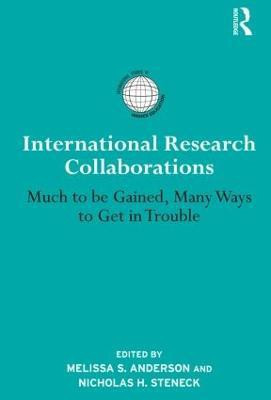International Research Collaborations - Much to be Gained, Many Ways to Get in Trouble(English, Paperback, unknown)
Quick Overview
Product Price Comparison
Encouraged by their institutions and governments and aided by advances in technology and communication, researchers increasingly pursue international collaborations with high hopes for scientific breakthroughs, intellectual stimulation, access to research equipment and populations, and the satisfaction of global engagement. International Research Collaborations considers what can and does go wrong in cross-national research collaborations, and how scientists can avoid these problems in order to create and sustain productive, mutually-enriching partnerships. Unfamiliar approaches to training, legal and regulatory complications, and differences in funding and administration pose challenges for collaboration that are then compounded by the need to satisfy the requirements of different research systems. To help todayŌĆÖs international researchers create the best possible partnerships, chapters by funding officers, diplomats, attorneys, publishers, regulators, graduate students and postdocs, industry researchers, administrators, and scholars of responsible research address the following key trouble spots: how research is organized and funded the legal and normative environments of research differences in regulation and oversight variation in graduate education and postdoctoral training. International Research Collaborations will provide valuable insights to researchers who are collaborating or who intend to collaborate, as well as to administrators, funders, regulators, editors, and policy-makers involved in cross-national research. Table of Contents Part I. International Research Collaborations 1. What Can Be Gained and What Can Go Wrong in the Context of Different National Research Environments 2. Research Integrity in the Context of Global Cooperation 3. Considerations Upon Setting Out to Collaborate Internationally Part II. Differences in the Organization and Funding of Research 4. National Variations in the Organization of Scientific Research 5. Evolution of National Funding Systems for Research 6. National Systems for Scientific Research in China Part III. Differences in Legal and Normative Environments 7. Legal and Regulatory Considerations in International Research Collaborations 8. The Governance of Scientific Collaborations: The International Reach of U.S. Law 9. Normative Environments of International Science Part IV. Differences in Regulatory and Publication Oversight 10. International Cooperation to Ensure Scientific Integrity 11. Scientific Integrity in the Context of Pan-European Cooperation 12. Collaborating with Colleagues in Latin America: Publication Issues Part V. Differences in Graduate Education and Postdoctoral Training 13. Differences in National Approaches to Doctoral Education: Implications for International Research Collaborations 14. The Emergence of International Postdoctoral Training 15. Preparing Students to Navigate Cross-National Differences in the Research Environment: The Role of Research-Integrity Education Part VI. Toward Successful International Research Collaborations 16. Proactive and Reactive Approaches to Facilitating International Collaborations Balancing Research Collaborations with the Realities of Working with Industry: Lessons from the Biotechnology Realm 18. Realizing Gains and Staying Out of Trouble Appendix Egypt India Singapore and China Toward Successful International Research Collaborations Contributor Biographies


